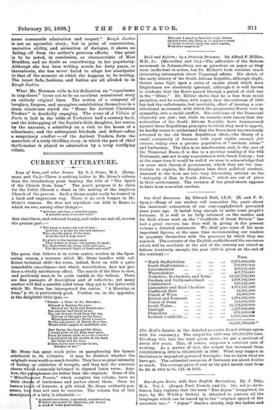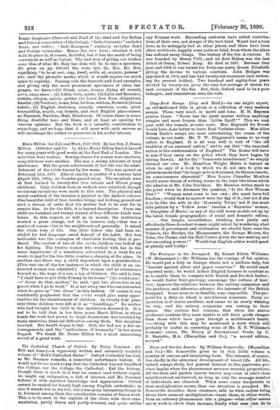Bur-Aryan Roots, with their English Derivatives. By J. Baly,. M.A.
Vol. I. (Regan Paul, Trench, and Co. 50s. net.)—Arch- deacon Baly explains that the term " Eur-Aryan" (suggested, he says, by Mr. W hitley Stokes) is intended to connote all the languages which can be traced up to the " original speech of the ancestral race." " Aryan " denotes strictly only the Indian and [ramie languages (Sanscrit and Zend of the dead and the Indian and Persian vernaculars of the living); "Indo-Germanic" excludes Imnic and Celtic ; " Indo-European " similarly excludes Zend and Persian vernacular. Hence the new term ; whether it will hold its place is, of course, doubtful, but it has the merit of being convenient as well as logical. The best way of giving our readers some idea of what Mr. Baly has done will be to take a specimen. He gives on pp. 239-241 the roots Qei, Qe, Kei, Ke, Kni, signifying " to be at rest, stay, dwell, settle at. acquire, possess " (we omit the phonetic marks, which it would require too much space to explain). Passing over the Sanscrit and Zend examples, and giving only the more prominent specimens of other lan- guages, we have,—(l) Greek, KE1#1.41, WICEGIVbf (lying all round), naive, son sawn ; (2) Latin, civis, quits; (3) Latin and Romance, ciutats, citoyen, quiete, quitter (to leave free from obligation), hamlet; (4) Teutonic, home, hire, hwilom, whilom, Heinrich (house ruler) ; (5) English derivates, comedy, cemetery, ocean, quiet, tranquillity, acquit, coy, homely, and such English place-names. as Harrison, Hawkins, Hall, Henderson. Of course there is some- thing doubtful here and there, and at least an opening for various opinions. But the book is a valuable contribution to etymology, and we hope that it will meet with such success as will encourage the author to persevere in his useful labours.







































 Previous page
Previous page